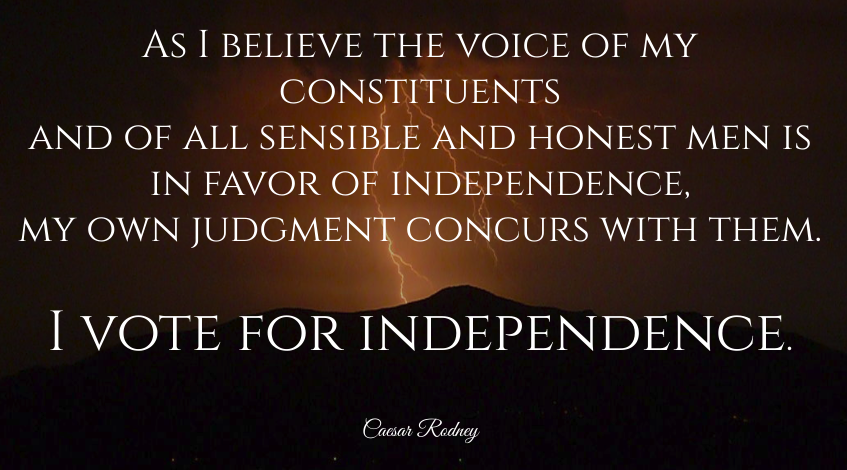Mark Cole
It was late June, 1776, Philadelphia.
George Read and Thomas McKean represented Delaware in the Second Continental Congress where the resolution for independence, having been introduced earlier in the month by Richard Henry Lee, was being debated and was moving inexorably towards a vote.
Even though the Delaware Assembly under the leadership of Speaker of the House Caesar Rodney had declared its independence on June 15, the entire Delaware delegation to the Continental Congress was not yet in unanimous agreement: Thomas McKean was for the resolution but George Read believed it to be too much, too soon.
The deciding vote for how Delaware would go was held by Caesar Rodney. Rodney had also been elected to the Continental Congress, but he was absent from Philadelphia.
The problem was that Rodney was not only an elected member of the Continental Congress, he was also the Speaker of the Delaware Assembly, and a brigadier general in the Delaware militia.
So, not being able to be in three places simultaneously, it happened that at this critical juncture Caesar Rodney was not in Philadelphia.
Without Rodney, Delaware could not vote as a colony for the independence resolution. And without Delaware, the critical element of the thirteen colonies speaking with one united voice would be lost. The destruction of that unanimity would be a major victory for the Crown.
Fully aware that the fate of the independence resolution might well lie with Delaware and thus with the absent Caesar Rodney, Thomas McKean sent a desperate message to Rodney, summoning him to Philadelphia so that he could cast his vote and put Delaware firmly into the independence column.
It was to be an agonizing eighty mile horse ride for Rodney through sweltering heat and a harsh thunderstorm, across mud-choked roads and rickety bridges, over slippery cobblestone streets.
As he splashed and galloped through the night, one has to wonder if it occurred to Rodney that he was rushing to vote for a resolution and then to sign a document which would invite a noose to be placed around his neck?
Rodney arrived in Philadelphia on the afternoon of July 2, just as debate was winding down. Exhausted and filthy, it has been recorded that before voting “yes” on the resolution, that he stated “As I believe the voice of my constituents and of all sensible and honest men is in favor of independence, my own judgment concurs with them. I vote for independence.”
And the rest, as they say, is history.
In addition to serving as the Speaker of the Delaware Assembly and the chief executive of Delaware during the revolution, Rodney was also appointed as a Major General in the Delaware militia by Thomas McKean. George Washington himself also appointed Rodney as the commander in Trenton to keep things in order after the critical victories at Princeton and Trenton were won.
Throughout his adult life – including during his famous horseback ride – Rodney suffered from a painful cancer in his face and from asthma. He would eventually die from these health complications in 1784, having lived only for a few months after independence was won.
For over a hundred years, Rodney’s grave remained unmarked. Finally, his body was moved to Christ Church in Dover and an appropriate monument was installed, which reads simply:
Caesar Rodney
1728-1784
Soldier, Statesman and Signer of the Declaration of Independence
Check out Mark’s book:
Lives, Fortunes, Sacred Honor: The Men Who Signed the Declaration of Independence













